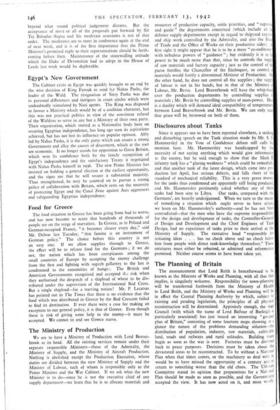Egypt's New Government
The Cabinet crisis in Egypt was quickly brought to an end by the wise decision of King Farouk to send for Nahas Pasha, the leader of the Wafd. The resignation of Sirry Pasha was due to personal differences and intrigues in court circles which were undoubtedly stimulated by Nazi agents. The King was disposed to favour a Ministry which would be of a coalition character, but this was not practical politics in view of the consistent refusal of the Wafdists to serve in any but a Ministry of their own party. Their organisation, which started as a Nationalist body bent on securing Egyptian independence, has long ago seen its aspirations achieved, but has not lost its influence on popular opinion. Ably led by Nahas Pasha, it is the only party which can assure a strong Government and allay the causes of discontent, which at the root are economic. It no longer stands for opposition to Great Britain, which won its confidence both by the timely recognition of Egypt's independence and the satisfactory Treaty it negotiated with Nahas Pasha himself in 1936. The new Prime Minister has insisted on holding a general election at the earliest opportunity, and the signs are that he will secure a substantial majority. Thus strengthened, he may be counted on to pursue a strong policy of collaboration with Britain, which rests on the necessity of protecting Egypt and the Canal Zone against Axis aggressors and safeguarding Egyptian independence.


























 Previous page
Previous page